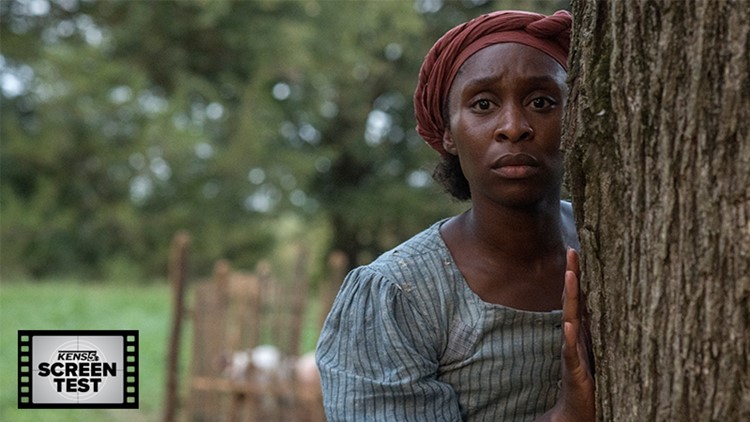Late in the third act of the historical superhero origin story “Harriet,” a white slave owner tells Cynthia Erivo’s abolitionist icon to prepare for the reckoning that’s to come in response to her now-revered efforts. “They’ll tear you limb from limb,” he says, hate spewing from his lips.
In a movie I struggled to engage with beyond the name-brand recognition of its protagonist, I suddenly found myself more involved than I had been for the two hours prior, and wondering: “Wait, is that where Harriet Tubman’s story ends up? Does she become a martyr, ending her life in the name of something she had devoted it to?”
Chalk it up to a blend of minimal education on Harriet’s life – which I’m now able to recognize the extent of – and the expectation that director Kasi Lemmons’s new film – by all accounts prioritizing accuracy over manufactured drama – would inevitably give in to urges of the medium that we often mistake to be obligatory. But (and this may be a spoiler of history) nothing of the sort constitutes “Harriet’s” finale.
Instead we get a brief, pre-credits lesson on what happened after Harriet’s time as the most successful conductor of the Underground Railroad—a coda much more worthy of any blaze of glory that a fictionalized version of this story may contain, and a lesser-known aspect of her life I found myself wishing I had spent two hours learning more about.
“Harriet” – working off a screenplay written by Lemmons and “Remember The Titans” scribe Gregory Allen Howard – is a document of history more than anything, an awkwardly-paced biopic feeding off an effective leading turn by Erivo and the weight of America to build visual muscle on a story most of us only gleaned the skeleton of from middle school textbooks.
In portraying the events that we most readily associate with Harriet’s legacy – freeing herself, returning to free her family, going on to free dozens more – Lemmons’s direction blends motif and mythos. Instructions to follow the North Star, the white slave captors on her trail, the songs used as coded farewells, the sun rising on a literal and symbolic new dawn while nearing Philadelphia—the symbolism in “Harriet” is as obvious as its attention to detail is paramount.
The fact they’re often one in the same perhaps says much about America’s wanting to forget what it did to its black people, and continues to do.
But there is also a struggle that “Harriet” catches itself in, a trade-off it has to make – and never really chooses to – in its priorities, through no fault of its own other than not being a straight-faced Harriet Tubman documentary. Sometimes it’s hard to tell whether Lemmons and Howard are indulging their creative urges or accuracy-seeking loyalties; because it’s by and large the latter, “Harriet” is almost aggressively devoid of tension.
Whenever danger feels like it’s about to pounce on our real-life heroine, a strange sixth sense kicks in – something she attributes to divine connection – and she is able to avoid it. These sequences are jarring; images of Erivo seemingly being possessed as she’s instructed by a wordless power on what to do next resemble needless attempts to stretch the grounded drama into genre territory. Yet these scenes, as contrary in tone as they feel, are just as much based in reality as everything else. Harriet always touted her faith and trust in God, attributing premonitions she experienced to a head injury she suffered as a child (something the film oh so subtly touches on).
On the one hand, the way Lemmons depicts Harriet’s faith makes for a movie-watching experience that can be difficult to empathize with. In a movie that already feels a bit cacophonous in its storytelling – it struggles to emotionally engage, and its script is a surface-level examination of a character in a most complex situation – the refusal to make its source material malleable ends up feeling more underwhelming than it should.
Early in the movie, the patriarch of the farm Harriet and her family works on dies days after his son watches her pray that God strike him down, and it’s hard to avoid feeling dubious about the bit of narrative convenience.
But what about when it’s actually functioning as hard-lined truth? Not only is that exactly how events happened, but “Harriet” continues to closely companion history in how Edward Brodess’s passing influenced her decision to escape. The powers of dramatization are held in check by Lemmons – “Django Unchained” and “12 Years a Slave,” “Harriet” stylistically is not – and as a result, it was difficult not to come away from her movie feeling like I’d just watched an uber-refined PBS production that sneaked out of the classroom and into the multiplex.
It’s because of that sacrificing of cinematic vigor at the altar of historical relevance that I struggled to find “Harriet” to be much of an urgent work, nor one that explores her transformation from Araminta Ross, slave into the Harriet Tubman, emblem of liberation, especially (and perhaps most disappointingly) outside the contextualization of the men in her life.
In steadfastly avoiding making Harriet’s life – her accomplishments, her impact, her sacrifices – fictionalized superficiality, “Harriet” nonetheless ends up resembling a superficial portrait of hyper-truism. The movie is based on a true story and, for once, the movie means it.
"Harriet" is rated PG-13 for thematic content throughout, violent material and language including racial epithets. This is a less brutal inclusion in Hollywood's Civil War-era movie canon.
Starring: Cynthia Erivo, Janelle Monáe, Joe Alywn, Jennifer Nettles
Directed by Kasi Lemmons
2019



